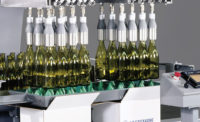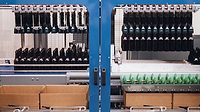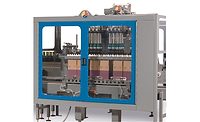Author and philanthropist Tony Robbins once said, “Stay committed to your decisions, but stay flexible in your approach.” Although meant in the context of following one’s life goals, staying flexible in one’s approach also can be beneficial to beverage manufacturers and the equipment they incorporate in the warehouse. The demand for innovative packaging equipment that not only is flexible, but easy-to-use, can handle a variety of packaging types and offers quick changeovers is driving the market for case packing and wrapping machinery.
Efficient case packing and wrapping equipment begins with flexibility, industry experts note.
“Beverage-makers are seeking case packing and packaging equipment solutions that can run more than one packaging design,” says Rick Gessler, vice president of engineering and marketing at Delkor Systems, St. Paul, Minn. “Flexibility is becoming more important for beverage-makers because of changing retailer requirements and the growing adoption of retail-ready packaging designs.”
“… We consistently see three main trends prominently within the beverage industry,” he continues. “First, packaging equipment flexibility continues to be important. Today’s packaging equipment must be flexible to erect, pack and seal multiple package formats such as shelf-ready packages (SRP), club store trays and standard [restaurant supply chain] (RSCs) and [foodservice supply chain] (FSCs) [solutions].
“An example of this is the introduction of flexible pouches used by Daily’s Cocktails into a retail environment where pouches had not previously existed,” he says. “Daily’s leverages the Delkor Cabrio Case to present their cocktail pouches at a wide range of retailers.”
The Cabrio Case is designed and packed by the company’s LSP Series Robotic Case Packer, which can pack pouches and bags into retail-ready packages, stackable club store trays and standard shipping boxes, Gessler says.
“This robotic solution was created specifically to address the need for package format flexibility,” he says. “The ability to adapt to package formats that suit retailers ranging from club stores to convenience stores and mass grocers allows producers to leverage the flexibility of this equipment to adapt to a changing marketplace. Beverage-makers can switch to any of these package formats with just a simple, tool-less changeover process.”
Todd Welker, beverage sales manager at Alexandria, Minn.-based Douglas Machine Inc. also highlights the important of flexible solutions with easy changeovers. “New lines typically require both size and format flexibility,” he says.
“This requirement [then] drives the need for simple and potentially automated changeover functions,” Welker continues. “More [packaging] formats mean that operators are performing more changeovers, so ease and simplicity of changeovers is essential. Functions such as automatic lane changes, rotary counters with [human-machine interface] HMI feedback, and automatic changeover features simplify changeovers and decreases downtime.”
The need for multiple sizes and formats for core brands, as well as co-packing requirements also are contributing to the flexibility factor, he adds.
Delkor’s Gessler also notes the importance of simplified changeovers and its ability to drive innovation for beverage manufacturers. “The second trend we see is related to package flexibility, which is the machines’ ability for quick changeover between package formats, with a fast return to 100 percent production,” he says.
In addition to quick-change cartridge-style tooling, a trend to meet these changeover requirements is the engineering of tool-less changeover processes that enable plant operators to quickly set the packaging lines to run different package formats while reducing production downtown, Gessler adds.
Reducing production downtime is the third most common trend, he continues. “Beverage-makers have a greater need now more than ever for higher uptime and operating efficiency,” he says. “Time is money when in a production plant and any lost time due to a machine being down or being changed over can be costly for a beverage business. That means end-of-line systems must be engineered to meet aggressive uptime requirements but also speed for production.”
In line with this trend, Delkor designed the Performance Series Loader, a compact case loading machine that not only offers flexibility, but produces a wide range of finished packages using a minimum of change parts that are 3-D printed to enable quick deployment of new package formats, according to Gessler.
Douglas Machine also offers a machine with simplified changeover requirements: the CpONE Intermittent Motion Case Packer. The CpONE features a 45 percent reduction in changeover points with 40 percent fewer parts required to do so, allowing for simple operation and maintenance, the company says.
Thinking ahead
Before investing in new case packing and wrapping equipment, beverage-makers should consider several factors, experts note.
Reduced case count is driving faster line speeds in secondary and tertiary packaging, therefore, future packaging sizes will need to be taken into account, Douglas Machine’s Welker explains. “For example, if you currently run a 12-count case and are suddenly directed to a six-count case at twice the speed, it is better to plan ahead for [that kind of] flexibility in lieu of replacing entire systems,” he says.
Delkor’s Gessler echoes similar sentiments about the importance of determining what type of packaging will be running on the line, today and into the future. “If you think you’ll need to accommodate new package designs such as shelf-ready packaging, then it is critical to invest in a case packer that will enable you to pack more than one package design,” he explains. “Having a simple changeover to transition from one package style to another is also important in this case to help reduce downtown at a plant.”
Implementing fully automated operations also is an important consideration for beverage-makers. “For companies who have not fully automated their end-of-line operations, the most important consideration is to determine whether it’s time to do so,” Gessler advises.
He highlights McManis Family Winery, a customer that experienced increased demand, necessitating the need to fully automate its line to keep up with demand. McManis implemented the Delkor Flex Loader, an automated case packer that was customized to suit the company’s needs such as stainless steel for washdown, tempered glass doors and flap conditioners to ensure case flaps are optimally opened for when wine bottles are loaded, he adds.
Green machines
As an increasing number of consumers trend toward sustainable packaging options, equipment companies also are working to accomplish the same goals. Although sustainability has made a significant impact on the industry as a whole, most of the changes lie within packaging designs, Delkor’s Gessler says. However, more retailers are demanding that secondary packaging follow these same guidelines.
“More retailers and beverage-makers are adopting more sustainable package designs that both reduce material use and can be recycled after use,” he says. “For instance, Walmart has been one such retailer that has established aggressive sustainability goals and has tied their adoption of retail-ready packaging to those goals by requiring all [retail-ready packaging] that are used in their stores to be fully recyclable.”
To address sustainability specifications, Delkor designed the aforementioned Cabrio Case, which is optimized for flexible products such as pouches, as well as the Turbo Case, which is ideal for rigid containers such as bottles, Gessler explains.
“Both designs use recyclable corrugated materials and the Turbo Case’s shrink wrapping is made of recyclable plastic,” he says. “In addition, both help beverage-makers save significantly in materials, which help improve sustainability and drive down cost.”
The Cabrio Case saves as much as 20 percent in materials compared with traditional tear-away hood cases, while the Turbo Case saves as much as 40 percent in materials compared with traditional shipping boxes, according to Gessler.
Sustainability has been a strong topic of conversation during the past few years as companies strive to reduce their environmental footprint and “go green,” Douglas Machine’s Welker says. However, as packaging formats decrease to smaller sizes and counts, it also drives up packaging speed and flexibility, thereby potentially requiring more materials, he warns.
Advanced engineering
Current trends in the packaging industry will continue to drive innovation for case packing and wrapping equipment, experts say. “Engineering will continue to advance case packing machines to be more versatile and require less maintenance,” Delkor’s Gessler says.
For instance, the technology used in the above-mentioned Delkor Performance Series Loader has helped case packers more efficiently pick-and-pack patterns at high speeds while removing the need for additional parts such as collation chains, buckets and fixed guides, Gessler says.
Less machine parts required equates to less maintenance and less capital investment on said parts, he adds.
“Additionally, 3-D printed replacement parts such as printed pickup heads will also be more prevalent in future case packing equipment to help reduce cost of parts and increase speed of receiving replacement parts for machines,” he says.
Douglas Machine’s Welker also highlights that machines requiring less materials for changeover will continue to drive innovation in the industry. Beverage manufacturers will look for machines that operate at higher speeds while simultaneously requiring less materials to get the job done, he says. BI







